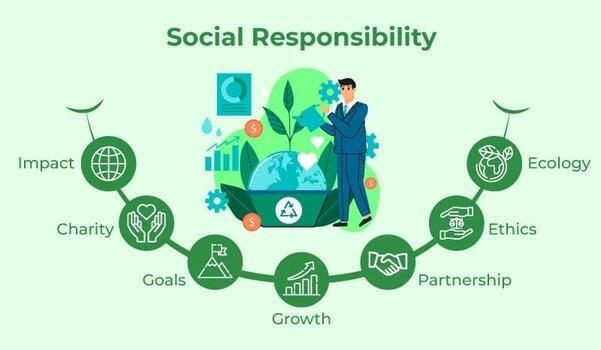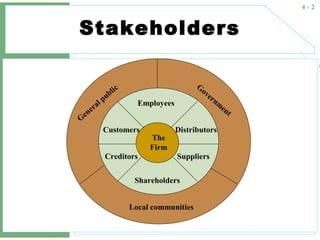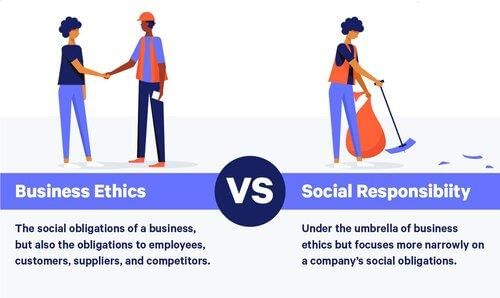|
Social responsibility in business entails the obligation to make decisions and perform actions that align with the objectives and values of society, considering the impact on others and contributing positively to community well-being. |
Card: 2 / 44 |
|
True or False: Social responsibility is limited to legal obligations that businesses must follow. |
Card: 3 / 44 |
|
False. Social responsibility goes beyond legal obligations and includes voluntary actions that benefit society even if they are not required by law. |
Card: 4 / 44 |
|
Fill in the blank: A business should avoid actions that are detrimental to the interests of the ___. |
Card: 5 / 44 |
|
What is a key difference between social responsibility and legal responsibility for businesses? |
Card: 7 / 44 |
|
The key difference is that social responsibility includes voluntary actions that benefit society, while legal responsibility pertains strictly to compliance with laws and regulations. |
Card: 8 / 44 |
|
Riddle: I am a business principle that goes beyond profit and legal requirements, focusing on the well-being of society. What am I? |
Card: 9 / 44 |
|
Short Answer: Why should businesses consider the impact of their actions on the lives of others? |
Card: 11 / 44 |
|
Businesses should consider the impact of their actions on the lives of others because they rely on society for resources and have a responsibility to contribute positively to the community, ensuring sustainable and ethical practices. |
Card: 12 / 44 |
|
What are the primary stakeholders that a business should consider beyond its owners? |
Card: 13 / 44 |
|
True or False: Social responsibility is a mandatory obligation for all businesses. |
Card: 15 / 44 |
|
False. Social responsibility is voluntary and businesses can decide the extent to which they serve society. |
Card: 16 / 44 |
|
Fill in the blank: The debate surrounding social responsibility in business often centers on whether a firm's only social responsibility is towards its ___ or should include all sections of society affected by its decisions. |
Card: 17 / 44 |
|
Riddle: I can be ethical or unethical, and I shape the way businesses interact with society. What am I? |
Card: 19 / 44 |
|
What is the main ethical issue related to social responsibility that businesses face? |
Card: 21 / 44 |
|
Determining what is morally right or wrong in relation to a firm's responsibilities. |
Card: 22 / 44 |
 Unlock all Flashcards with EduRev Infinity Plan Starting from @ ₹99 only
|
|
What is the primary motive of a business according to arguments for social responsibility? |
Card: 25 / 44 |
|
The primary motive of a business is profit, which helps the business grow and expand. |
Card: 26 / 44 |
|
Fill in the blank: A firm's long-term interest benefits when its highest goal is ___ to society. |
Card: 27 / 44 |
|
True or False: Businesses that are socially responsible can avoid government regulations. |
Card: 29 / 44 |
|
Riddle: I create wealth and opportunities, yet I can also cause harm. What am I? |
Card: 31 / 44 |
|
Fill in the blank: When businesses turn socially responsible, they contribute to social ___ and harmony. |
Card: 33 / 44 |
|
By leveraging their resources and expertise to create profitable solutions to social issues. |
Card: 36 / 44 |
|
True or False: Businesses have no responsibility for the social problems they create. |
Card: 37 / 44 |
|
False: Businesses are often held responsible for problems like environmental pollution and discrimination. |
Card: 38 / 44 |
|
The primary argument is that businesses exist solely to maximize profits, and they fulfill their social responsibility best by increasing efficiency and reducing costs. |
Card: 40 / 44 |
|
Fill in the blank: Taking social care requires huge financial investments, which may lead businesses to increase their costs and put the burden on ___ for their charitable expenses. |
Card: 41 / 44 |
|
True or False: Businessmen are generally considered to have a strong understanding of social problems and can solve them efficiently. |
Card: 43 / 44 |
|
False. Businessmen often lack understanding of social problems and cannot solve them efficiently.  |
Card: 44 / 44 |






























